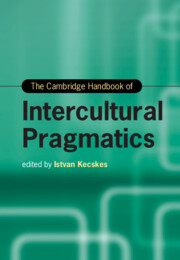Book contents
- The Cambridge Handbook of Intercultural Pragmatics
- Cambridge Handbooks in Language and Linguistics
- The Cambridge Handbook of Intercultural Pragmatics
- Copyright page
- Contents
- Figures
- Tables
- Acknowledgment
- Contributors
- Introduction The Rise of Intercultural Pragmatics
- Part I Theoretical Foundation
- 1 Post-Gricean Pragmatics for Intercultural Communication
- 2 Relevance Theory and Intercultural Communication
- 3 Cognitive Psychology in Pragmatics
- 4 The Theoretical Framework of Intercultural Pragmatics
- Part II Key Issues in Intercultural Pragmatics Research
- Part III Interface of Intercultural Pragmatics and Related Disciplines
- Part IV Intercultural Pragmatics in Different Types of Communication
- Part V Language Learning
- Index
- References
2 - Relevance Theory and Intercultural Communication
from Part I - Theoretical Foundation
Published online by Cambridge University Press: 29 September 2022
- The Cambridge Handbook of Intercultural Pragmatics
- Cambridge Handbooks in Language and Linguistics
- The Cambridge Handbook of Intercultural Pragmatics
- Copyright page
- Contents
- Figures
- Tables
- Acknowledgment
- Contributors
- Introduction The Rise of Intercultural Pragmatics
- Part I Theoretical Foundation
- 1 Post-Gricean Pragmatics for Intercultural Communication
- 2 Relevance Theory and Intercultural Communication
- 3 Cognitive Psychology in Pragmatics
- 4 The Theoretical Framework of Intercultural Pragmatics
- Part II Key Issues in Intercultural Pragmatics Research
- Part III Interface of Intercultural Pragmatics and Related Disciplines
- Part IV Intercultural Pragmatics in Different Types of Communication
- Part V Language Learning
- Index
- References
Summary
Relevance Theory is a cognitive pragmatic theory devoted to utterance interpretation. Its main assumption is that linguistic communication is guided by the communicative principle of relevance, which states that the addressee is invited to take the speaker’s contribution as optimally relevant. In intracultural communication, the crucial point is to understand how communication succeeds, since its success depends not on a complete linguistic decoding but rather on accessing the relevant contextual assumptions; that is, the assumptions that are closest to the speaker’s informative intention. This chapter’s first aim is to elucidate both how Relevance Theory is included in Grice’s legacy, and how it diverges from Grice. Its second aim is to discuss the place of Relevance Theory in pragmatics today, and more specifically to explore whether Relevance Theory makes different predictions than do neo-Gricean approaches. Its third aim is to give insights into Relevance Theory’s contributions to the intercultural pragmatics agenda, and in particular to discuss how Relevance Theory converges with but also diverges from the intercultural pragmatics paradigm initiated by Kecskes in 2014.
Keywords
- Type
- Chapter
- Information
- The Cambridge Handbook of Intercultural Pragmatics , pp. 40 - 62Publisher: Cambridge University PressPrint publication year: 2022

